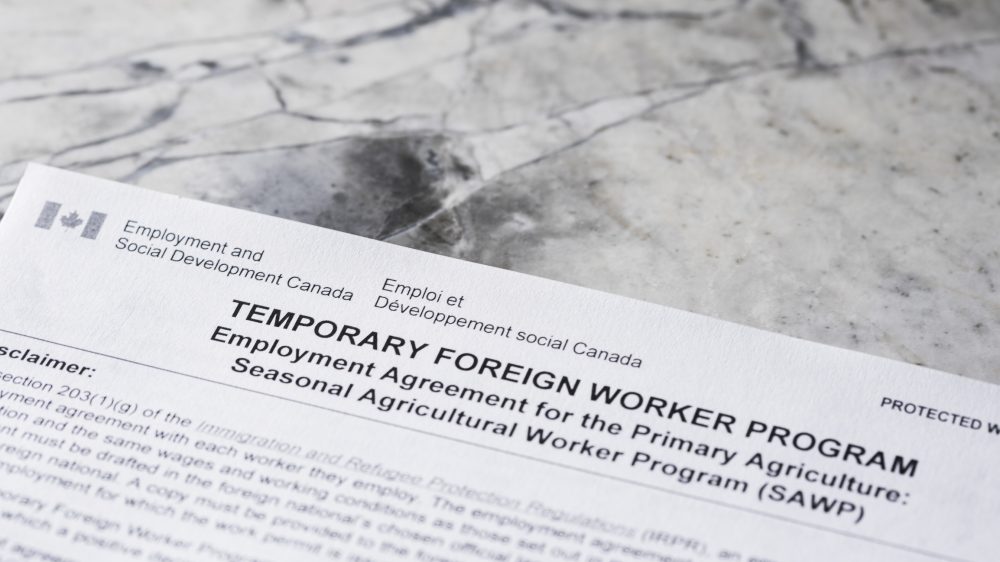The federal Strong Borders Act might make life more precarious for temporary foreign workers, the National Farmers Union says.
“[We think] Bill C-2 creates even greater volatility and makes them even more vulnerable,” said NFU policy analyst James Hannay in an interview.
The union, in an August op-ed, urged the federal government to withdraw the sweeping Bill C-2, also called the Strong Borders Act. It cited concerns for migrants and refugees along with the bill’s impact on privacy rights.
Read Also

China imports no U.S. soybeans in September for first time in seven years
China imported no soybeans from the U.S. in September, the first time since November 2018 that shipments fell to zero, while South American shipments surged from a year earlier, as buyers shunned American cargoes during the ongoing trade dispute between the world’s two largest economies.
What does the bill cover?
The Liberal government introduced the bill in late May, and it passed its first reading before Parliament rose for the summer.
The bill, if passed, includes provisions purported to combat organized crime and fentanyl trafficking, expands the RCMP’s ability to share information with domestic and international partners, and introduces measures to combat money laundering.
It also would authorize Immigration, Refugees and Citizenship Canada (IRCC) to share more client information with federal and provincial partners. It would allow the government to cancel, suspend or change groups of immigration documents immediately, pause acceptance of new applications or pause or cancel applications already in the queue.
“These new authorities… could be used for matters of public health or national security,” a government backgrounder says.
Other amendments in the bill include intentions to set a one-year deadline to claim asylum.
Bill C-2 does not specifically mention temporary foreign workers.
Effects uncertain
If passed, the government would have the ability to cancel or modify work permits or impose new conditions on them.
“We don’t understand yet how this will impact temporary farm worker program. We would like some explanation on that,” Hannay said. “Theoretically, this could make migrant workers coming into Canada more vulnerable to changes in status.”
Many workers come to Canada with employer-specific work permits, Hannay said. This means they could lose their status if they leave their employer due to poor working conditions or treatment.
The NFU’s view is that the easiest way to guarantee workers’ rights is to give them a pathway to permanent residency status.
“Bill C-2 does the opposite of that,” Hannay said.
Temporary foreign workers and workers under the Seasonal Agricultural Worker Program have some ability to move between employers, the Ontario Fruit and Vegetable Growers Association noted in an August 2024 article.
For instance, vulnerable workers who are victims of abuse can apply for an open work permit.
Seasonal workers can also request to be transferred to a different approved employer by their country’s liaison office without having to apply for a new work permit, the association said. Federal rules also provide protections for workers who report poor working conditions.
Labour trafficking concerns
Groups that work with migrants and refugees have also pushed back against Bill C-2.
“Having temporary or precarious immigration status is by far the greatest risk factor to experiencing labour trafficking in Canada,” said Julia Drydyk, executive director of the Canadian Centre to End Human Trafficking, in a June article about the bill.
Labour trafficking is defined as a form of human trafficking that involves coercion, control or deception, the article said. “It most often affects migrants who are in Canada legally but have precarious immigration status — including many temporary foreign workers.”
For instance, the worker might arrive at the workplace and realize the promises the employer made aren’t being fulfilled, but they are kept there by threats of deportation, James McLean, the centre’s director of research and policy, in an interview.
“The majority of farmers treat workers fairly,” he said. “But there are systemic issues that create vulnerabilities… employer-specific work permits make it very difficult for workers to report abuse or to leave unsafe conditions, and that allows exploitation to take root.”
“One of the reasons that the centre has really pushed back against recent legislation is because we’re starting to see stigmatization of migrant workers,” said McLean. “The Canadian economy depends on migrant workers to function… we want to make sure that the focus remains on those who are exploiting these workers, and not on punishing or restricting these workers.”
To become law, Bill C-2 must be considered by a parliamentary committee, which may propose amendments, and pass its second and third readings. It would then be passed to the Senate, where it would go a similar process.


















